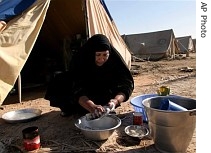-
(单词翻译:双击或拖选)
Irbil
16 February 2007
Hundreds-of-thousands of Iraqis have fled sectarian violence near their homes since Saddam Hussein was ousted1, and the U.N. says up to 1 million more could flee their homes this year. About half of them are believed to go abroad. The rest move elsewhere in Iraq. VOA's Barry Newhouse is in northern Iraq and has this profile of one man who decided2 this week that his neighborhood in the city of Mosul had become too dangerous for his family.
 |
| An Iraqi Shiite woman washes her dishes in a camp for Baghdad's displaced Shiite families in Diwaniyah |
In the back of the store, at the last chair, is the shop's newest barber, a 27-year-old Christian3 man who does not want to reveal his name for fear of reprisals4 against family he has left behind in Mosul. He asks to be called Bashar.
Bashar brought his wife and two children to Irbil in recent days, after the threats and killings5 in his Mosul neighborhood became too much to bear. He says Sunni Arabs are increasingly targeting Christians6 and Kurds.
"I can't even describe the situation to you - it's so hard," he said. "Especially nowadays, they are kidnapping so many people. Even people who sell gas or vegetables on the street. They take money from them, or kidnap and kill them, if they don't pay."
The International Organization for Migration7 (IOM) says nearly 400,000 people have been displaced over the past year in Iraq. It says a rise in sectarian violence led to the forceful removal of people from their homes in some mixed neighborhoods.
Mosul is Iraq's third largest city, and while it has not experienced the same level of sectarian killings as Baghdad, Bashar says the situation is becoming dire8.
He says Mosul's Muslim Arabs, Christians and Kurds have lived together for many years without major problems. Tension among the groups increased following the U.S.-led invasion of Iraq in 2003. But Bashar says the turning point for his neighborhood came last September, when the pope quoted a critic of Islam in a public address, sparking a violent reaction from extremist Muslims.
"When we heard the pope talk against Islam at that time, it was so hard for us," he added. "They attacked the churches and attacked our homes. They tell us, 'you are Christian and you must leave your home.'"
He says militants9 later kidnapped the local priest and cut off his arms, legs and head. Since then, Christians and Kurds have been leaving Mosul in increasing numbers. He says three-quarters of his neighbors have now left town, and many have abandoned their homes.
"Some people rent their houses, but others are taken by the Sunni refugees who come from Baghdad," he noted10. "They see it's an empty house, and they move in. But the people who get a warning and then leave town, sometimes the mujahadeen will use the house or they will blow it up."
Bashar's brother and father have stayed behind to guard the family home, and he worries for their safety. There are people in the neighborhood, Bashar calls them "spies," who he says call up local militants and tell them where the Christians and Kurds live. The family still does not know who threatened them several weeks ago.
"We don't know them. We can't see their faces, all we see is the mobile phone number when they call us. If they can't reach you on the phone, then they kidnap you. And if you don't have the money, or you don't pay, then you will be killed."
Bashar owned his barbershop in Mosul, which he was able to buy with the money earned from 11 years of cutting hair. When local militants found out, they demanded $6,000. He paid the money, but more demands followed. Facing few options, he decided to move to Irbil.
The Kurdish-majority city is only about 70 kilometers from Mosul, but it is a great deal safer. Tight Kurdish-run security makes the city a haven11 for Kurds and Christians, but it also keeps out many Arab Muslims.
"It's true the distance is only one hour between Irbil and Mosul, but I feel as if I'm in a strange country," he said. "It's so hard for me, because I left everything behind. I left my home, my shop and my friends. It's so expensive for us."
Bashar now makes less money cutting hair in someone else's barbershop. His brother works in construction. Their combined income is barely enough to get by, partly because the arrival of fleeing Iraqis has driven up local rents.
Bashar says he hopes the situation in Mosul eventually will improve enough for him to return. In the meantime, he says, the coming months will be difficult for him and his family.
 收听单词发音
收听单词发音
1
ousted

|
|
| 驱逐( oust的过去式和过去分词 ); 革职; 罢黜; 剥夺 | |
参考例句: |
|
|
|
2
decided

|
|
| adj.决定了的,坚决的;明显的,明确的 | |
参考例句: |
|
|
|
3
Christian

|
|
| adj.基督教徒的;n.基督教徒 | |
参考例句: |
|
|
|
4
reprisals

|
|
| n.报复(行为)( reprisal的名词复数 ) | |
参考例句: |
|
|
|
5
killings

|
|
| 谋杀( killing的名词复数 ); 突然发大财,暴发 | |
参考例句: |
|
|
|
6
Christians

|
|
| n.基督教徒( Christian的名词复数 ) | |
参考例句: |
|
|
|
7
migration

|
|
| n.迁移,移居,(鸟类等的)迁徙 | |
参考例句: |
|
|
|
8
dire

|
|
| adj.可怕的,悲惨的,阴惨的,极端的 | |
参考例句: |
|
|
|
9
militants

|
|
| 激进分子,好斗分子( militant的名词复数 ) | |
参考例句: |
|
|
|
10
noted

|
|
| adj.著名的,知名的 | |
参考例句: |
|
|
|
11
haven

|
|
| n.安全的地方,避难所,庇护所 | |
参考例句: |
|
|
|















